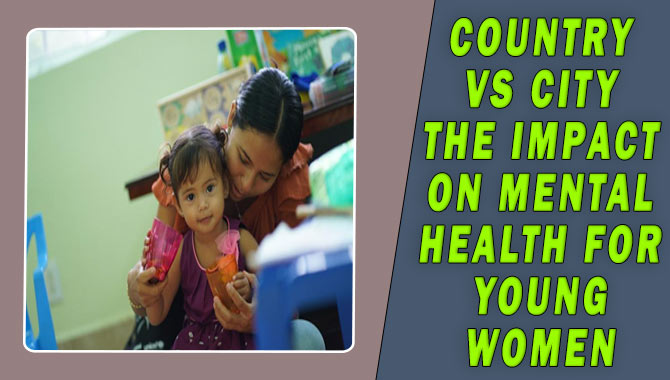Mental health is an integral part of overall well-being, and it can be particularly important for many young women. The mental health of young women is impacted by many factors.
Including the environment they live in, the relationships they have with others, and their personal goals and aspirations. The impact of country vs. city on mental health for young women is a complex issue influenced by several factors. Mental health greatly impacts an individual’s well-being and overall happiness. It determines how happy you are, how content you are with life, and how satisfied you are.
Although mental health is an individual factor, having a supportive social environment can greatly impact mental health. We talk about the country-city difference, The Impact on mental health for young women, and what you can do to improve mental health for young women in cities.

What Can Be Done To Improve Mental Health For Young Women?

Mental health is an important component of overall well-being and can be impacted by several factors, including one’s environment. Factors such as one’s social relationships and community connections, as well as access to mental health services and support, can play a key role in determining mental health status.
Another important factor to consider is the physical environment in which one lives. Cities have more opportunities for social interaction and access to various activities and entertainment. However, city life can also be stressful due to high noise, traffic, and air pollution levels.
The impact of country living on mental health may depend on a person’s personal preferences and circumstances. If you are looking for ways to improve your mental health, consider moving back home or relocating to a rural area where there are fewer stressors involved in day-to-day life.
The Top 4 Country Vs. City- The Impact On Mental Health For Young

Imagine living in a small town, far away from bustling city life. You might have a great deal of freedom and privacy, but you also may feel isolated and disconnected from the larger world. In addition, you might have fewer opportunities to find a job or make new friends. As we all know, the country’s lifestyle differs from city life’s.
When it comes to mental health, it is essential to understand the pros and cons of both lifestyles. Living in a big city has its own set of advantages. However, many young women have faced many problems due to their desire to stay in the city. Here 4 factors that can impact mental health in a country town:
1.Lack Of Proper Healthcare Facilities

Mental health issues are a growing concern in the country, especially among women. Lack of proper healthcare facilities, such as mental health centers and psychiatrists, can contribute to this health issue. Women living in cities face a greater risk of mental health issues than those who live in rural areas.
This is due to urban areas’ lack of access to healthcare services, including mental health services. These gaps can impact women’s mental health in many ways, such as increasing their risk of depression and anxiety or making them more susceptible to mental illness by limiting their access to treatment options.
2.Lack Of Support Network

While it may seem like a dream to escape the hustle and bustle of city life and move to the country, for many young women, country life can be a lonely place. There are few resources for young people in many rural areas, including support networks and mental health professionals. This can lead to isolation and depression, linked to poor mental health outcomes such as substance misuse, anxiety, and depression.
Additionally, women often need more access to healthcare and transportation in rural areas. The lack of support networks in rural areas can make it difficult for young women to cope with these issues or seek help. If you are thinking about changing your life by moving to the country, make sure that you have support systems in place if things get tough.
3.Poor Work Opportunities

According to a study published in the British Journal of Psychiatry, women who live in rural areas or small towns are more likely to suffer from depression than their city counterparts. The study also found that young women with these conditions were more likely to live in poverty, experience poor mental health, and have lower levels of education.
A study by the World Health Organization has also shown that women face a higher risk of mental health issues if they work in the agriculture, mining, and manufacturing sectors. These sectors are mostly associated with low pay and less flexible working hours.
In addition, they are not provided with proper training to deal with mental health issues on the job. This can be due to a lack of awareness about mental health issues among employers and the lack of support systems for those with such an issue. Women’s lack of work opportunities can further lead to depression and other mental health problems.
4.Limited Access To Recreational Activities

Indoor recreational activities, such as playing sports or going to the movies, are important for maintaining physical and mental health. But do we have enough of these opportunities in our cities? The answer is a big no! These opportunities are scarce in cities, and they are often only available to the privileged few.
The lack of recreational activities makes it difficult for people to maintain their mental health. In addition to this, people who live in cities also struggle with depression and anxiety due to the hectic lifestyles they lead. If you’re a city dweller who wants to keep your mind and body healthy, you can do a few things. First, try to get involved in some activity that gives you a sense of purpose and fulfillment.
Whether that’s volunteering or coaching your kids’ team, or taking up dance classes, next up, make sure that you have access to fresh air and sunlight as much as possible-a walk in the park, or a jog around the neighborhood is good for your soul as well as your body.
And finally, try not to overdo it when it comes down to work-life balance-if. You’re always exhausted because you’re running from one meeting to another every day, and something has gone wrong. So take care of yourself by ensuring you’re getting enough exercise and having fun now and then!
How The Environment In Cities Affects Mental Health

Urban living can be a challenging task for both individuals and communities. People who live in cities face many unique challenges, such as higher levels of pollution, traffic, and crime, as well as higher levels of stress due to the high demand for resources like food, water, and housing. These factors can have a significant impact on mental health.
Living in an urban area also increases the risk of depression, anxiety, and other mental health disorders for people from all walks of life. The city environment can also profoundly impact mental health by shaping how people think about themselves and their place in the world.
Urban environments can contribute to loneliness or isolation by making it difficult for people to connect with others or find activities they enjoy. In addition to environmental factors, socioeconomic status (SSS) and level of education can also play a significant role in mental health. Individuals with greater SSS and higher levels of education are less likely to develop mental health problems or seek help if they do.
The Effect Of Living In A City On Mental Health

The environment in cities is a major factor that impacts the mental health of individuals. Living in an urban setting can lead to several mental health issues, such as stress, anxiety, and depression. The prevalence of these conditions is higher among individuals who live in cities. Urban environments can also harm mental health due to exposure to advertisements and media. Individuals more exposed to these factors may have a greater risk of developing mental health disorders.
Why Do Young Women Choose To Live In A City Or Rural Area?

Several factors play a major role in determining where a person chooses to live. These factors include values, lifestyle, economic opportunities, and mental health. A person’s mental health can be affected by many things, such as the types of friends they make, the places they choose to go, and their support system.
When choosing a city or rural area, it is important to ensure that you have a good support system and surroundings that will help you adjust to your new life. Living in a small city is always better than living in a big one for mental health reasons.
It will help you learn about yourself and become independent from others. Living in an urban setting provides you with more opportunities for education and work than living in a rural area. Living in a city or rural area also gives you the freedom to make choices about your career and personal life without being overly influenced by other people’s opinions or expectations.
What Can Be Done To Improve Mental Health For Young Women In Cities?

Mental health is an important part of overall health. Factors such as environment and lifestyle, mental health disorders, and mental health care can impact it. In cities, many aspects play a role in mental health, including air pollution and smog, traffic problems, noise pollution from cars and construction sites, limited green spaces to walk around in, higher stress, etc.
These aspects can harm your mental health. A change in the environment can help improve the overall quality of life. Cities offer many employment and career growth opportunities that can help improve mental health.
Mental health care facilities are available in cities but are often underutilized. Or not properly equipped to handle patients with mental disorders. A well-trained team of doctors and other professionals is essential to improve access to quality mental healthcare. So make sure you seek help if you feel like your mental health is suffering due to the above-mentioned factors!
Conclusion
Several ways may affect Young Women’s mental health when comparing the impact of living in a city vs. a country town. For women, exposure to more social and cultural activities in a city can lead to greater mental health benefits, such as increased optimism and self-esteem. Living in a country can also positively impact mental health, as the lack of stress caused by city life can have an overall positive effect.
To help young women in cities cope with mental health issues and support their well-being, it is important to understand the factors contributing to mental health challenges in young people. The social environment and support systems help people manage stress and mental health problems.
However, poverty, isolation, limited access to resources, and discrimination can negatively affect mental health. Young people who experience harmful environments and support systems are more likely to experience mental health issues than those who thrive in supportive ones. Here’s a podcast that explores how parents can support their children through difficult times by listening non-judgmentally.
Frequently Asked Questions
1.What Are Some Common Reasons Why Young Women Move To A City?
Ans: Some common reasons young women move to a city include seeking a better education. And career opportunities, wanting to live in a bigger city, and wanting more nightlife options. Some of the mental health benefits associated with living in a city include increased opportunities for socializing and the ability.
To integrate more seamlessly into different cultures. However, living in a city can also be stressful because of finding a balance between work. And personal life can be difficult.
2.Is Mental Health Better In Rural Or Urban Areas?
Ans: Many factors, including social environment, lifestyle, and environmental conditions influence mental health, which is an essential component of overall well-being. Individuals with mental health issues often seek medical treatment, but the underlying causes for the condition can vary greatly.
Factors like socioeconomic status, access to mental health care and services, or even one’s values can profoundly impact mental health and well-being in an individual’s life.
3.How Does Society Affect Women’s Mental Health?
Ans: Society affects women’s mental health in several ways. For example, women in cities suffer from higher rates of mental health problems than women in rural areas. The social pressure to conform to societal norms and expectations often leads to depression and anxiety in women. Factors such as poverty, unemployment, and low self-esteem also contribute to mental health problems in women.
4.Are Cities Associated With Higher Rates Of Mental Health Problems Compared To Rural Areas?
Ans: Most mental health problems have higher rates associated with cities. However, the impact of city living on mental health is complex and varies from person to person. Some people who live in cities may experience greater social isolation and stress than those who live in rural areas. In addition, city living may lead to increased exposure to environmental toxins and noise levels.
5.What Is The Difference Between Work Stressors And Home Stressors?
Ans: The difference between work and home stressors is that work stressors are the everyday challenges and stresses encountered while working. On the other hand, home stressors are the unique challenges and stresses that arise from living in a city or rural area.
Living in a city can also increase the stress of living with family members. Young women in cities experience more work stress than those in rural areas. However, living in a city does not increase the stress of living with family members to the same degree as it does for young women who live in rural areas.

I’m a writer and blogger who loves to talk about entertainment, culture, and relationships. I love to share my thoughts and insights on these topics, and I’m always looking for new ways to engage with my readers. I’m also a big fan of learning new things, so I’m always exploring new areas of interest.
